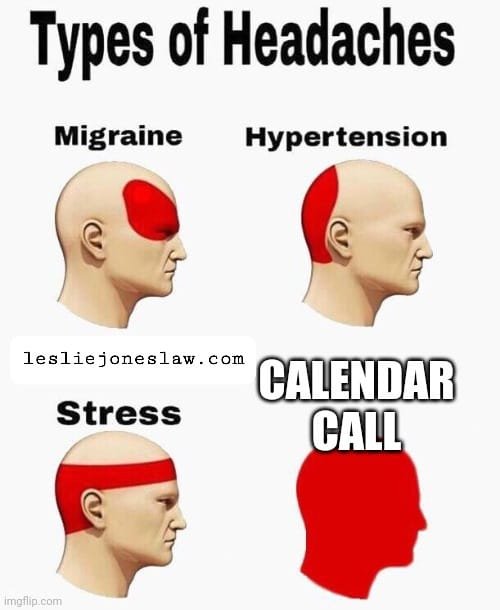What on Earth is a Calendar Call?
Many Clients I work with have never been in trouble before. So, once they are charged with a crime, they do not know what to expect.
To say that the law has a lot of procedures and court appearances that are obscure and don’t make much sense is an understatement! One of the many ways that I help Clients is to explain these procedures to them so they can understand what to expect as we work on their case.
Calendar call is one of the procedures that is most foreign to Clients. Especially because there seem to be endless calendar call dates, month after month, in some cases.
When a person is formally charged with a crime by indictment or accusation, usually their first appearance before the court is an arraignment. If the person enters a not guilty plea at arraignment, discovery is provided by the State, and a period of time is allowed for the defense to review the discovery and file motions or challenges to the case.
Within a certain period of time after arraignment, the case will be placed on a “calendar call” or “status hearing calendar.”
Calendar call is a day where all people that have cases that have been arraigned and are before a certain judge are brought in-person to court so the State and defense can say what needs to be done—if anything—on the case before it can go to trial. Often, these calendars will have dozens of cases on them.
At the calendar call, the State and defense announce whether:
all legal challenges and motions have been filed and heard, or if they need to be scheduled for a hearing;
any discovery still needs to be provided by the State;
further investigation is necessary;
all witnesses are available for trial; and
the case can be resolved without a trial.
If the case can be resolved without a trial and the State and defense have a plea agreement or other disposition—dismissal (the best possible result), a dead docket, or pre-trial diversion agreement—that is announced and handled at calendar call.
If the case is not resolved at calendar call, then the parties announce whether they are ready for trial or not.
If the case is not ready for trial, it is placed on a later calendar call or motions hearing date.
If the case is ready for trial, then it will be placed on the trial week calendar.
There are only so many hours in each week and there are hundreds of cases before each court. So, if a case is not reached during the trial week, it will be placed on the next calendar call.
As you can imagine, all of these dates can cause headaches for both the Client and the attorney. Navigating this process is important, however, and strategic advantages can be gained or lost based on how a case is approached. Calendar calls, therefore, are necessary evils in the criminal court process!
**This blog post is informational only. It does not constitute legal advice, and it does not create an attorney-client relationship. As with all legal matters, you should consult with an attorney for advice on your particular case.
